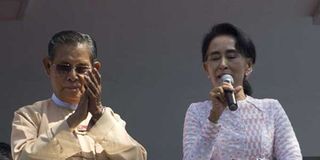After long wait, Suu Kyi has power in her sights

Myanmar's leader Aung San Suu Kyi (right) delivers a speech from the balcony of the NLD headquarters in Yangon on November 9, 2015. Fresh fighting has broken out between the military and rebel groups in Myanmar’s north. PHOTO | YE AUNG THU |
What you need to know:
In a sign of the deep craving for change in the nation, voters handed the party 80 per cent of elected seats in the national legislature.
Suu Kyi was locked up for 15 years by paranoid generals fearful of the democracy campaigner’s enormous popularity.
YANGON, Sunday
Wielding an overwhelming mandate from Myanmar’s voters, Aung San Suu Kyi has power in her sights after a quarter century of democratic struggle against the army, but analysts say building bridges with former military foes is vital to her success.
A resounding victory for Suu Kyi and her National League for Democracy (NLD) sets the stage for a radical rebalancing of power in Myanmar, dominated for generations by repressive and economically-ruinous military rule.
In a sign of the deep craving for change in the nation, voters handed the party 80 per cent of elected seats in the national legislature.
The result sends a “strong signal to the military that the writing is on the wall and your domination is coming to an end”, said political analyst Khin Zaw Win.
Suu Kyi was locked up for 15 years by paranoid generals fearful of the democracy campaigner’s enormous popularity.
But to rule she will have to foster a relationship with the country’s military elites, who continue to hold significant political and economic power despite reforms under a quasi-civilian regime that replaced junta rule in 2011.
NLD GOVERNMENT
Observers predict tremulous times ahead for the Nobel laureate, with some four months before an NLD led government can take the reins under Myanmar’s complex political system.
Burned into public memory is the bitter disappointment of 1990 elections, which were won overwhelmingly by the NLD only to be ignored by the military, who clung to power for another two decades.
So far the signs are positive, according to Khin Zaw Win who said the NLD had a “once in a century” chance to steer Myanmar towards a brighter future. Suu Kyi, 70, has taken a conciliatory approach, declining to make a victory speech and seeking talks with President Thein Sein and army chief Min Aung Hlaing, due to go ahead in the coming days.
The army have sought to reassure Myanmar’s nervous citizens, indicating a willingness to work with their erstwhile arch foes in the NLD, who will flood into the capital Napyidaw in February when a new parliament session opens.
That new parliament will still have a quarter of its seats reserved for unelected soldiers.
But there will also be scores of fledgling NLD lawmakers whose previous occupations as poets, hip-hop stars, political prisoners and doctors have earned them public respect but little legislative experience.
Khin Zaw Win urged the untested party to accept a wide spectrum of advice as it finds its feet.
“The NLD has overachieved in the election but there is a strong chance it will underachieve in government unless it takes the necessary steps,” he said.





